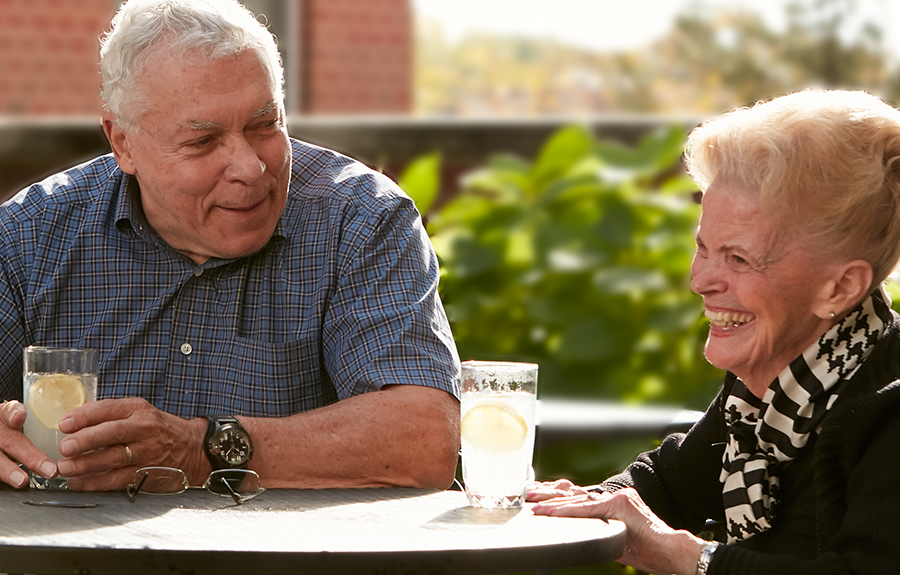Growing older may be inevitable, but wearing dentures doesn't have to be. With proper home care and periodic professional checkups, it's possible to keep your natural teeth as your age advances. Implement the following five oral hygiene tips to protect the one set of permanent teeth you get in life.
1. Brush at least twice a day with a toothpaste that contains fluoride.
You may think you're too old to get cavities, but that's not true. Cavities occur more often in older adults, especially on the exposed root surfaces of the teeth. The Centers for Disease Control and Prevention (CDC) reports that nearly 1 in 5 adults aged 65 and over have untreated tooth decay.
Other reasons cavities are common in seniors include:
- Old fillings are susceptible to tooth decay.
- Many seniors didn't get enough fluoride from water supplies or toothpaste in childhood.
- As the gums recede with age, tooth roots are left exposed. The lack of protection from enamel makes them more vulnerable to decay.
WebMD states that fluoride is the most important ingredient to look for when choosing a toothpaste. This naturally occurring mineral helps protect teeth from the acid-producing bacteria in your mouth that feed on the sugars and starches left behind after you eat. Fluoride strengthens tooth enamel and helps remineralize areas that have started to decay.
2. Floss at least once a day.
Flossing is a critical part of taking care of your teeth and gums. About 68% of adults aged 65 years or older have gum or periodontal disease, according to the CDC. This is caused by some of the more than 500 bacterial species found in plaque, which irritate the gums and often cause them to swell and bleed.
Flossing lets you clean between the teeth and around the gum line to remove plaque in areas your toothbrush can't reach, helping to prevent cavities and gum disease. Remember that gum disease is often a painless condition until the advanced stage. If it goes untreated, gums can pull away from the teeth and form pockets where food particles and more plaque collect. Advanced gum disease can lead to tooth loss as the bone and ligaments supporting the teeth are damaged.
3. Rinse with an antiseptic mouthwash a few times a day.
Swishing an antibacterial rinse around your mouth after brushing, and meals if you can't brush, can reduce bacteria that causes plaque and gum disease. Additional benefits include fresher breath and possibly less sensitivity to hot and cold temperature extremes if you choose a fluoride mouth rinse.
Sensitive teeth can be bothersome for some seniors. As the gums naturally recede with age, areas of the tooth not protected by enamel are exposed. You might notice pain when consuming hot or cold foods or beverages. Sometimes even cold air can trigger discomfort. If you try both a fluoride mouthwash and an anti-sensitivity toothpaste but continue to experience pain, see your dentist. It could be due to a cavity or cracked tooth.
4. Deal with dry mouth.
Most seniors take both prescription and over-the-counter medications, more than 500 of which can cause dry mouth. When saliva flow is reduced, the risk of cavities increases. This is because saliva protects your teeth from decay, helps heal mouth sores and prevents infections.
Symptoms of dry mouth include frequent thirst, a dry feeling in the throat and bad breath. If this is a problem for you, ask your doctor to adjust your medications or to prescribe an oral rinse to restore mouth moisture. There are also medications that boost saliva production.
Other steps that may help improve saliva flow include:
- Using sugar-free candy or gum that contains xylitol.
- Increasing your water intake to help keep your mouth constantly lubricated.
- Adding moisture to the bedroom air with a humidifier.
5. Visit your dentist regularly for cleaning and an oral exam.
A regularly scheduled professional cleaning to remove dental plaque from teeth is crucial for preventing cavities, gingivitis and gum disease. But the comprehensive exam from your dentist that includes an oral cancer screening is also a very important reason to show up for your appointment.
There are approximately 35,000 cases of mouth, throat and tongue cancer diagnosed each year, according to the American Cancer Society. The median age at diagnosis is 62 years old. In the early stages, oral cancer typically doesn't cause pain. Therefore, early detection through regular dental visits can be life-saving.
At Brightview Senior Living communities, we know how important it is for our resident seniors to enjoy wellness in all areas, including dental health. Let us treat you to lunch or dinner so we can show you around our vibrant community with all the comforts of home.

